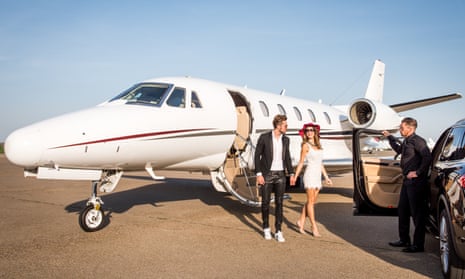The climate crisis is not in transit, it’s arrived at the gate. It’s in our skies, our water, and our land – with record-shattering heat waves, increasingly severe wildfires and flooding from superstorms and rising seas.
We have no time for delays. Tackling this crisis and protecting frontline environmental justice communities will take all of us. And the tax-dodging ultra-wealthy need to stop fueling the problem and start supporting first-class solutions.
That’s why, this July, I introduced the Fueling Alternative Transportation with a Carbon Aviation Tax (Fatcat) Act with Congresswoman Nydia Velázquez.
Private air travel is the most energy-intensive form of transportation. For each passenger, private jets pollute as much as 14 times more than commercial flights and 50 times more than trains. Despite their sky-high emissions, private air travel is taxed considerably less than commercial air travel.
My legislation changes that. Because the 1% should not get a free ride while destroying our environment.
At the moment, billionaires and the ultra-wealthy are getting a bargain, paying less in taxes each year to fly private and contribute more pollution than millions of drivers combined on the roads below. Just one hour of flying private negates the climate benefits of driving an electric car for an entire year. That is unfair and it is unacceptable.
For the sake of our environment, it is time to ground these fat cats and make them pay their fair share, so that we can invest in building the energy-efficient and clean public transportation that our economy and communities across the country desperately need. We cannot continue to ask frontline communities – disproportionately low-income, rural, immigrant, Black and brown Americans who are bearing the weight of the climate crisis – to subsidize billionaires jet-setting the globe.
Our legislation would increase fuel taxes for private jet travel from the current $0.22 to nearly $2 a gallon – the equivalent of an estimated $200 a metric ton of a private jet’s CO2 emissions – and remove existing fuel tax exemptions for private flight activities that worsen the climate crisis, like oil or gas exploration.
The revenue generated by the Fatcat Act would be transferred to the Airport and Airway Trust Fund and a newly created federal Clean Communities Trust Fund to support air monitoring for environmental justice communities and long-term investments in clean, affordable public transportation across the country – including passenger rail and bus routes near commercial airports.
To fully tackle the climate crisis at the scale that is required, we need to ensure that those who are fueling this problem are held accountable for contributing to the solution. It is, of course, the same logic that should, but sadly does not, apply to our tax code.
If Jeff Bezos, Elon Musk, Mark Zuckerberg, and countless Wall Street hedge fund managers want to fly private jets, the least they can do is pay their fair share in taxes to compensate for the damage to our environment and the wear on our infrastructure. It’s unconscionable that they be allowed to continue to pay pennies on the dollar to pollute our environment as Americans suffer through the hottest days in an estimated 125,000 years. Everyday Americans should not have to pay for their excess.
And let’s be clear: this is an issue of economic and environmental justice. The wealthiest 1% globally are responsible for more than twice as much carbon dioxide pollution as the bottom 50%. But the burden of that pollution gets passed along to people already struggling.
A billionaire who takes to the skies in a private jet isn’t going to feel the hardship of paying a sky-high air conditioning or electric bill. The ultra-wealthy who own their own airplanes aren’t going to feel the hardship of breathing dirty air.
We are approaching a dangerous tipping point in our battle against the climate crisis. This summer’s brutal weather is just a preview of what is to come. We all need to step up to do our part to address this crisis. Especially jet-setting billionaires.
Edward J Markey is a US senator from Massachusetts
